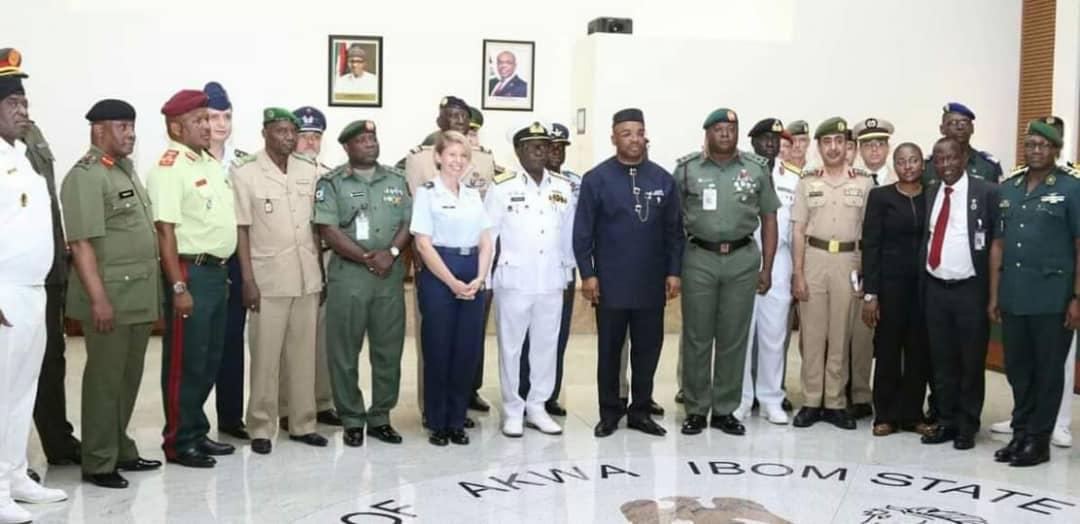Global Amnesty special rapporteur commends Nigerian military’s
…..tasks FG, NGOs to resettle IDPs in liberated communities
The Global Amnesty Watch (GAW) says the Nigerian military has displayed effective coordination against Boko Haram in the north-east.
The group said this commendation after a systematic tour of selected communities, including Chibok, Gwoza and Madagali – all supposed strongholds of the radical Islamic sect.
Advertisement
In a situation report signed by Williams Cullen and delivered at a press briefing in Abuja on Wednesday, the human rights group revealed said its primary objective was to examine the situation of things in the region, ascertaining whether any Nigerian territory is under the control of Boko Haram/ISWAP fighters.
To achieve this, the group said it adopted all necessary strategies, employing the services of interpreters and a guide to navigate as well as assistance from the Nigerian Army, providing security cover for the team where needed.
Among others, in the end, Cullrn commended the troops for their sustained efforts to ensure that the region continues to enjoy the return of peace.
Advertisement
The group established that no part of the visited communities is under the control of the sect as against what is being portrayed by some section of the media.
Read full report:
The Global Amnesty Watch, in line with its mandate of serving as that watchdog on Human Rights compliance by government and organizations around the world in a bid to ascertain the situation of things in North-East Nigeria, undertook a systematic tour of select locations in North-East Nigeria. The tour availed the GAW Special Rapporteur a first-hand knowledge of the condition of things, as well as the role of the government in bringing to an end the crisis in the North East region.
Introduction:
Advertisement
In the light of the news making the rounds on the occupation of Nigerian territories by the Boko Haram/ISWAP terrorist group, the Global Amnesty Watch (GAW) commissioned a team of select researchers to undertake a systematic tour of select communities in North-East Nigeria with a mandate to highlight the situation of things and also to ascertain if and whether any Nigerian territory is under the occupation of Boko Haram/ISWAP fighters.
These researchers relied on information making the rounds on areas that are under the Boko Haram/ISWAP occupation to draw the list of communities to be visited. Consequently, Dambao, Gwoza, Postikum, Chibok, and Madagali were identified as areas to be visited to put to rest the various speculations making the rounds and also to put the issues in proper perspectives for members of the unsuspecting public.
The Situation Report:
The tour of select communities in North-East Nigeria did come with some communications challenges. As such, the researchers relied on local interpreters and a guide to be able to navigate the terrain. The Nigerian Army also provided security cover for the team in areas that are not motorable in a bid to avoid landmine areas.
Advertisement
The situation of things in the select communities presented a picture of relative calm and with reconstruction works ongoing at every nook and cranny even though at a low scale. Scores of people were seen returning to these communities, and normalcy seems to be the order of the day.
In Chibok, the researchers observed that there were skirmishes between the youths and the members of the Civilian JTF who disagreed on the modalities for the security of the community since the return of peace to the area. The youths wanted to have control of the security apparatus, a situation that irked members of the Civilian JTF members. This eventually led to a situation wherein protest some overbearing youths took laws into their hands and went berserk in protest. The situation was, however, brought under control by the intervention of the Nigerian Army company stationed in the community as part of the Super Camp Strategy introduced by the Army hierarchy to ensure adequate patrol of areas in search of Boko Haram/ISWAP remnants.
Advertisement
In Damboa, the researchers witnessed an atmosphere of relative peace. This was occasioned by the presence of military personnel in critical locations keeping vigil while the locals go about their normal businesses.
The case of Potiskum presented an interesting scenario for the team of researchers in the sense that the town was bustling with commercial activities. Upon interaction with the locals, it was stated that the last time Potiskum experienced any form of insurgent activity was in 2015. Since then, they have moved on with their lives without fear of any attack from the Boko Haram terrorist group.
Advertisement
In Gwoza, the situation was a bit tensed in the sense that rumours were rife in the air of possible attack of the community by Boko Haram elements. The team of researchers observed that the security situation in the area was beefed up, and this somewhat placed a restriction on both human and vehicular movements.
In Madagali, the situation was calm as there was no atmosphere of threats to peace and tranquillity. The town can be seen under surveillance by troops who were constantly patrolling and carrying out stop and search operations.
Advertisement
There were also signs of reconstruction works going on, and it was gathered that in the past one year, lots of locals that hitherto took refuge in IDP camps had been returning home in droves.
Conclusion:
The Global Amnesty Watch upon the scrutiny of the report of the researcher’s herby states that no Nigerian territory is under the control of Boko Haram/ISWAP terrorist, rather the more significant part of North-East Nigeria is gradually returning to normalcy.
The Global Amnesty Watch also notes that though there is relative peace in these areas, a lot still needs to be done mainly by the newly established North East Development Commission. The North East Development Commission must, as a matter of urgency, hit the ground running to complement the efforts of other critical stakeholders in rebuilding and resettlement of Internally Displaced Persons in the North East region.
The activities of International NGOs, as well as local NGOs operating in the region, must reflect the commitment to helping the IDPs relocate back home, especially in the liberated communities. They must also assist the people with means of livelihood such as farming fishing and other trades that would make life meaningful for them.
It is also vital that the Nigerian Police is also involved in the clearance operations in a bid to ensure that other criminal elements do not arise in the name of Boko Haram.
Commendations:
The Global Amnesty Watch owing from the situation on the ground in North-East Nigeria commends the efforts of the Nigerian military for their sustained efforts to ensure that the region continues to enjoy the return of peace.
The Global Amnesty Watch also lauds the administration of President Muhammadu Buhari for the show of commitment ending the Boko Haram crisis in North-East Nigeria, and also worthy of note is the rescue of over 17,500 children and women from Boko Haram captivity in North-East Nigeria.
Add a comment






